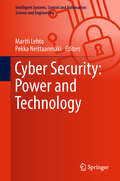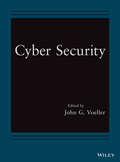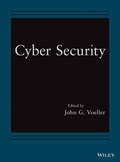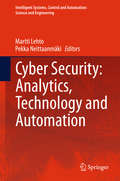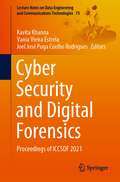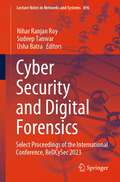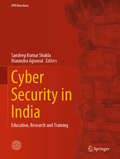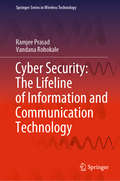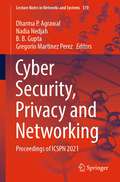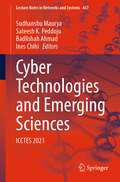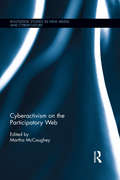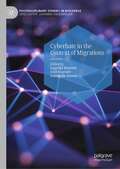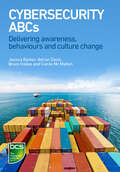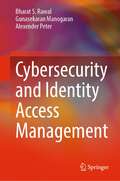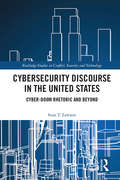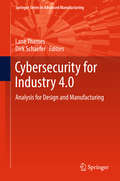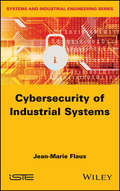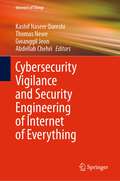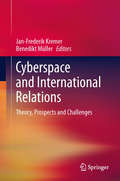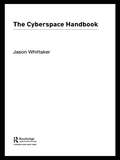- Table View
- List View
Cyber Security: Power and Technology (Intelligent Systems, Control and Automation: Science and Engineering #93)
by Martti Lehto Pekka NeittaanmäkiThis book gathers the latest research results of scientists from different countries who have made essential contributions to the novel analysis of cyber security. Addressing open problems in the cyber world, the book consists of two parts. Part I focuses on cyber operations as a new tool in global security policy, while Part II focuses on new cyber security technologies when building cyber power capabilities. The topics discussed include strategic perspectives on cyber security and cyber warfare, cyber security implementation, strategic communication, trusted computing, password cracking, systems security and network security among others.
Cyber Security
by John G. VoellerCyber Security features articles from the Wiley Handbook of Science and Technology for Homeland Security covering topics related to cyber security metrics and measure and related technologies that meet security needs. Specific applications to web services, the banking and the finance sector, and industrial process control systems are discussed.
Cyber Security
by John G. VoellerCyber Security features articles from the Wiley Handbook of Science and Technology for Homeland Security covering topics related to cyber security metrics and measure and related technologies that meet security needs. Specific applications to web services, the banking and the finance sector, and industrial process control systems are discussed.
Cyber Security: Analytics, Technology and Automation (Intelligent Systems, Control and Automation: Science and Engineering #78)
by Martti Lehto Pekka NeittaanmäkiThe book, in addition to the cyber threats and technology, processes cyber security from many sides as a social phenomenon and how the implementation of the cyber security strategy is carried out.The book gives a profound idea of the most spoken phenomenon of this time. The book is suitable for a wide-ranging audience from graduate to professionals/practitioners and researchers. Relevant disciplines for the book are Telecommunications / Network security, Applied mathematics / Data analysis, Mobile systems / Security, Engineering / Security of critical infrastructure and Military science / Security.
Cyber Security and Digital Forensics: Proceedings of ICCSDF 2021 (Lecture Notes on Data Engineering and Communications Technologies #73)
by Kavita Khanna Vania Vieira Estrela Joel José Puga Coelho RodriguesThis book features high-quality research papers presented at the International Conference on Applications and Techniques in Cyber Security and Digital Forensics (ICCSDF 2021), held at The NorthCap University, Gurugram, Haryana, India, during April 3–4, 2021. This book discusses the topics ranging from information security to cryptography, mobile application attacks to digital forensics, and from cyber security to blockchain. The goal of the book is to provide 360-degree view of cybersecurity to the readers which include cyber security issues, threats, vulnerabilities, novel idea, latest technique and technology, and mitigation of threats and attacks along with demonstration of practical applications. This book also highlights the latest development, challenges, methodologies as well as other emerging areas in this field. It brings current understanding of common Web vulnerabilities while maintaining awareness and knowledge of contemporary standards, practices, procedures, and methods of Open Web Application Security Project. It also expounds how to recover information after a cybercrime.
Cyber Security and Digital Forensics: Select Proceedings of the International Conference, ReDCySec 2023 (Lecture Notes in Networks and Systems #896)
by Nihar Ranjan Roy Sudeep Tanwar Usha BatraThe book contains peer-reviewed papers from the International Conference on Recent Developments in Cyber Security organized by the Center for Cyber Security and Cryptology at Sharda University in June 2023. This volume focuses on privacy and secrecy of information, cryptography, applications and analysis, cyber threat intelligence and mitigation, cyber-physical systems, cyber threat intelligence, quantum cryptography and blockchain technologies and their application, etc. This book is a unique collection of chapters from different areas with a common theme and will be immensely useful to academic researchers and practitioners in the industry.
Cyber Security in India: Education, Research and Training (IITK Directions #4)
by Sandeep Kumar Shukla Manindra AgrawalThis book of 'directions' focuses on cyber security research, education and training in India, and work in this domain within the Indian Institute of Technology Kanpur. IIT Kanpur's Computer Science and Engineering Department established an ‘Interdisciplinary Center for Cyber Security and Cyber Defense of Critical Infrastructures (C3I Center)’ in 2016 with funding from the Science and Engineering Research Board (SERB), and other funding agencies. The work at the center focuses on smart grid security, manufacturing and other industrial control system security; network, web and data security; cryptography, and penetration techniques. The founders are involved with various Indian government agencies including the Reserve Bank of India, National Critical Information Infrastructure Protection Center, UIDAI, CCTNS under home ministry, Ministry of IT and Electronics, and Department of Science & Technology. The center also testifies to the parliamentary standing committee on cyber security, and has been working with the National Cyber Security Coordinator's office in India. Providing glimpses of the work done at IIT Kanpur, and including perspectives from other Indian institutes where work on cyber security is starting to take shape, the book is a valuable resource for researchers and professionals, as well as educationists and policymakers.
Cyber Security: The Lifeline of Information and Communication Technology (Springer Series in Wireless Technology)
by Ramjee Prasad Vandana RohokaleThis book discusses a broad range of cyber security issues, addressing global concerns regarding cyber security in the modern era. The growth of Information and Communication Technology (ICT) and the prevalence of mobile devices make cyber security a highly topical and relevant issue. The transition from 4G to 5G mobile communication, while bringing convenience, also means cyber threats are growing exponentially. This book discusses a variety of problems and solutions including: • Internet of things and Machine to Machine Communication; • Infected networks such as Botnets; • Social media and networking; • Cyber Security for Smart Devices and Smart Grid • Blockchain Technology and • Artificial Intelligence for Cyber Security Given its scope, the book offers a valuable asset for cyber security researchers, as well as industry professionals, academics, and students.
Cyber Security, Privacy and Networking: Proceedings of ICSPN 2021 (Lecture Notes in Networks and Systems #370)
by Dharma P. Agrawal Nadia Nedjah B. B. Gupta Gregorio Martinez PerezThis book covers selected high-quality research papers presented in the International Conference on Cyber Security, Privacy and Networking (ICSPN 2021), organized during 17-19 September 2021 in India in Online mode. The objectives of ICSPN 2021 is to provide a premier international platform for deliberations on strategies, recent trends, innovative approaches, discussions and presentations on the most recent cyber security, privacy and networking challenges and developments from the perspective of providing security awareness and its best practices for the real world. Moreover, the motivation to organize this conference is to promote research by sharing innovative ideas among all levels of the scientific community, and to provide opportunities to develop creative solutions to various security, privacy and networking problems.
Cyber Technologies and Emerging Sciences: ICCTES 2021 (Lecture Notes in Networks and Systems #467)
by Sudhanshu Maurya Sateesh K. Peddoju Badlishah Ahmad Ines ChihiThe book is a collection of best selected research papers presented at International Conference on Cyber-Technologies and Emerging Sciences (ICCTES 2021), organized by Graphic Era Hill University, Bhimtal Campus, Uttarakhand, India, during 17 – 18 December 2021. The book covers state-of-the-art applications, innovative methods, and analyze the unexplored and unsolved challenges to establish the relative solutions to advance the existing applications and theories of Cyber-Technologies and Emerging Sciences.
Cyberactivism on the Participatory Web (Routledge Studies in New Media and Cyberculture)
by Martha McCaugheyCyberactivism already has a rich history, but over the past decade the participatory web—with its de-centralized information/media sharing, portability, storage capacity, and user-generated content—has reshaped political and social change. Cyberactivism on the Participatory Web examines the impact of these new technologies on political organizing and protest across the political spectrum, from the Arab Spring to artists to far-right groups. Linking new information and communication technologies to possibilities for solidarity and action—as well as surveillance and control—in a context of global capital flow, war, and environmental crisis, the contributors to this volume provide nuanced analyses of the dramatic transformations in media, citizenship, and social movements taking place today.
Cyberactivism on the Participatory Web (Routledge Studies in New Media and Cyberculture)
by Martha McCaugheyCyberactivism already has a rich history, but over the past decade the participatory web—with its de-centralized information/media sharing, portability, storage capacity, and user-generated content—has reshaped political and social change. Cyberactivism on the Participatory Web examines the impact of these new technologies on political organizing and protest across the political spectrum, from the Arab Spring to artists to far-right groups. Linking new information and communication technologies to possibilities for solidarity and action—as well as surveillance and control—in a context of global capital flow, war, and environmental crisis, the contributors to this volume provide nuanced analyses of the dramatic transformations in media, citizenship, and social movements taking place today.
Cyberhate in the Context of Migrations (Postdisciplinary Studies in Discourse)
by Angeliki Monnier Axel Boursier Annabelle SeoaneThis edited book takes an interdisciplinary approach to shed light on the complex dynamics involved in the incidence of online hate speech against migrants in user-generated contexts. The authors draw on case studies from Finland, France, Germany, Italy, Poland and the UK, bringing together qualitative and quantitative analyses on user-generated online comments. The authors argue that online hate speech against migrants must be understood as a symptom of a representation crisis on migration, which can only be fully perceived through the study of the complex linguistic, interactional and connective processes within which it emerges. They focus on representations and shared meanings, community building and otherness, and delve into the role of network ecosystems in the process of the construction of public problems. This book will be of interest to undergraduate and post-graduate students as well as academics working on hate speech and migration studies in a variety of fields, and can also contribute to improving research protocols for automated analyses and detections of online hate speech.
Cybersecurity ABCs: Delivering awareness, behaviours and culture change
by Jessica Barker Ciarán Mc Mahon Adrian Davis Bruce HallasCybersecurity issues, problems and incidents don’t always relate to technological faults. Many can be avoided or mitigated through improved cybersecurity awareness, behaviour and culture change (ABCs). This book guides organisations looking to create an enhanced security culture through improved understanding and practice of cybersecurity at an individual level. Key awareness, behaviour and culture concepts are covered from the ground up, alongside practical tips and examples.
Cybersecurity ABCs: Delivering awareness, behaviours and culture change
by Jessica Barker Ciarán Mc Mahon Adrian Davis Bruce HallasCybersecurity issues, problems and incidents don’t always relate to technological faults. Many can be avoided or mitigated through improved cybersecurity awareness, behaviour and culture change (ABCs). This book guides organisations looking to create an enhanced security culture through improved understanding and practice of cybersecurity at an individual level. Key awareness, behaviour and culture concepts are covered from the ground up, alongside practical tips and examples.
Cybersecurity and Identity Access Management
by Bharat S. Rawal Gunasekaran Manogaran Alexender PeterThis textbook provides a comprehensive, thorough and up-to-date treatment of topics in cyber security, cyber-attacks, ethical hacking, and cyber crimes prevention. It discusses the different third-party attacks and hacking processes which a poses a big issue in terms of data damage or theft. The book then highlights the cyber security protection techniques and overall risk assessments to detect and resolve these issues at the beginning stage to minimize data loss or damage. This book is written in a way that it presents the topics in a simplified holistic and pedagogical manner with end-of chapter exercises and examples to cater to undergraduate students, engineers and scientists who will benefit from this approach.
Cybersecurity Discourse in the United States: Cyber-Doom Rhetoric and Beyond (Routledge Studies in Conflict, Security and Technology)
by Sean T. LawsonThis book examines the role of cyber-doom rhetoric in the U.S. cybersecurity debate.For more than two decades, fear of "cyber-doom" scenarios—i.e. cyberattacks against critical infrastructure resulting in catastrophic physical, social, and economic impacts—has been a persistent feature of the U.S. cybersecurity debate. This is despite the fact that no cyberattack has come close to realizing such impacts. This book argues that such scenarios are part of a broader rhetoric of cyber-doom within the U.S. cybersecurity debate, and takes a multidisciplinary approach that draws on research in history, sociology, communication, psychology, and political science. It identifies a number of variations of cyber-doom rhetoric, then places them into a larger historical context, assesses how realistic the fears expressed in such rhetoric are, and finally draws out the policy implications of relying on these fears to structure our response to cybersecurity challenges. The United States faces very real cybersecurity challenges that are, nonetheless, much less dramatic than what is implied in the rhetoric. This book argues that relying on cyber-doom rhetoric to frame our thinking about such threats is counterproductive, and encourages us to develop ways of thinking and speaking about cybersecurity beyond cyber-doom.This book will be of much interest to students of cybersecurity, foreign policy, public administration, national security, and international relations in general.
Cybersecurity Discourse in the United States: Cyber-Doom Rhetoric and Beyond (Routledge Studies in Conflict, Security and Technology)
by Sean T. LawsonThis book examines the role of cyber-doom rhetoric in the U.S. cybersecurity debate.For more than two decades, fear of "cyber-doom" scenarios—i.e. cyberattacks against critical infrastructure resulting in catastrophic physical, social, and economic impacts—has been a persistent feature of the U.S. cybersecurity debate. This is despite the fact that no cyberattack has come close to realizing such impacts. This book argues that such scenarios are part of a broader rhetoric of cyber-doom within the U.S. cybersecurity debate, and takes a multidisciplinary approach that draws on research in history, sociology, communication, psychology, and political science. It identifies a number of variations of cyber-doom rhetoric, then places them into a larger historical context, assesses how realistic the fears expressed in such rhetoric are, and finally draws out the policy implications of relying on these fears to structure our response to cybersecurity challenges. The United States faces very real cybersecurity challenges that are, nonetheless, much less dramatic than what is implied in the rhetoric. This book argues that relying on cyber-doom rhetoric to frame our thinking about such threats is counterproductive, and encourages us to develop ways of thinking and speaking about cybersecurity beyond cyber-doom.This book will be of much interest to students of cybersecurity, foreign policy, public administration, national security, and international relations in general.
Cybersecurity for Industry 4.0: Analysis for Design and Manufacturing (Springer Series in Advanced Manufacturing)
by Lane Thames Dirk SchaeferThis book introduces readers to cybersecurity and its impact on the realization of the Industry 4.0 vision. It covers the technological foundations of cybersecurity within the scope of the Industry 4.0 landscape and details the existing cybersecurity threats faced by Industry 4.0, as well as state-of-the-art solutions with regard to both academic research and practical implementations. Industry 4.0 and its associated technologies, such as the Industrial Internet of Things and cloud-based design and manufacturing systems are examined, along with their disruptive innovations. Further, the book analyzes how these phenomena capitalize on the economies of scale provided by the Internet.The book offers a valuable resource for practicing engineers and decision makers in industry, as well as researchers in the design and manufacturing communities and all those interested in Industry 4.0 and cybersecurity.
Cybersecurity of Industrial Systems
by Jean-Marie FlausHow to manage the cybersecurity of industrial systems is a crucial question. To implement relevant solutions, the industrial manager must have a clear understanding of IT systems, of communication networks and of control-command systems. They must also have some knowledge of the methods used by attackers, of the standards and regulations involved and of the available security solutions. Cybersecurity of Industrial Systems presents these different subjects in order to give an in-depth overview and to help the reader manage the cybersecurity of their installation. The book addresses these issues for both classic SCADA architecture systems and Industrial Internet of Things (IIoT) systems.
Cybersecurity of Industrial Systems
by Jean-Marie FlausHow to manage the cybersecurity of industrial systems is a crucial question. To implement relevant solutions, the industrial manager must have a clear understanding of IT systems, of communication networks and of control-command systems. They must also have some knowledge of the methods used by attackers, of the standards and regulations involved and of the available security solutions. Cybersecurity of Industrial Systems presents these different subjects in order to give an in-depth overview and to help the reader manage the cybersecurity of their installation. The book addresses these issues for both classic SCADA architecture systems and Industrial Internet of Things (IIoT) systems.
Cybersecurity Vigilance and Security Engineering of Internet of Everything (Internet of Things)
by Kashif Naseer Qureshi Thomas Newe Gwanggil Jeon Abdellah ChehriThis book first discusses cyber security fundamentals then delves into security threats and vulnerabilities, security vigilance, and security engineering for Internet of Everything (IoE) networks. After an introduction, the first section covers the security threats and vulnerabilities or techniques to expose the networks to security attacks such as repudiation, tampering, spoofing, and elevation of privilege. The second section of the book covers vigilance or prevention techniques like intrusion detection systems, trust evaluation models, crypto, and hashing privacy solutions for IoE networks. This section also covers the security engineering for embedded and cyber-physical systems in IoE networks such as blockchain, artificial intelligence, and machine learning-based solutions to secure the networks. This book provides a clear overview in all relevant areas so readers gain a better understanding of IoE networks in terms of security threats, prevention, and other security mechanisms.
Cyberspace and International Relations: Theory, Prospects and Challenges
by Jan-Frederik Kremer Benedikt MüllerCyberspace is everywhere in today’s world and has significant implications not only for global economic activity, but also for international politics and transnational social relations. This compilation addresses for the first time the “cyberization” of international relations - the growing dependence of actors in IR on the infrastructure and instruments of the internet, and the penetration of cyberspace into all fields of their activities. The volume approaches this topical issue in a comprehensive and interdisciplinary fashion, bringing together scholars from disciplines such as IR, security studies, ICT studies and philosophy as well as experts from everyday cyber-practice. In the first part, concepts and theories are presented to shed light on the relationship between cyberspace and international relations, discussing implications for the discipline and presenting fresh and innovative theoretical approaches. Contributions in the second part focus on specific empirical fields of activity (security, economy, diplomacy, cultural activity, transnational communication, critical infrastructure, cyber espionage, social media, and more) and address emerging challenges and prospects for international politics and relations.
The Cyberspace Handbook
by Jason WhittakerThe Cyberspace Handbook is a comprehensive guide to all aspects of new media, information technologies and the internet. It gives an overview of the economic, political, social and cultural contexts of cyberspace, and provides practical advice on using new technologies for research, communication and publication. The Cyberspace Handbook includes: *a glossary of over eighty key terms*a list of over ninety web resources for news and entertainment, new media and web development, education and reference, and internet and web information* specialist chapters on web design and journalism and writing on the web*Over thirty illustrations of internet material and software applications.Jason Whittaker explores how cyberspace has been constructed, how it is used and extends into areas as different as providing us immediate news or immersive games and virtual technologies for areas such as copyright and cybercrime, as well as key skills in employing the internet for research or writing and designing for the Web.
The Cyberspace Handbook
by Jason WhittakerThe Cyberspace Handbook is a comprehensive guide to all aspects of new media, information technologies and the internet. It gives an overview of the economic, political, social and cultural contexts of cyberspace, and provides practical advice on using new technologies for research, communication and publication. The Cyberspace Handbook includes: *a glossary of over eighty key terms*a list of over ninety web resources for news and entertainment, new media and web development, education and reference, and internet and web information* specialist chapters on web design and journalism and writing on the web*Over thirty illustrations of internet material and software applications.Jason Whittaker explores how cyberspace has been constructed, how it is used and extends into areas as different as providing us immediate news or immersive games and virtual technologies for areas such as copyright and cybercrime, as well as key skills in employing the internet for research or writing and designing for the Web.
